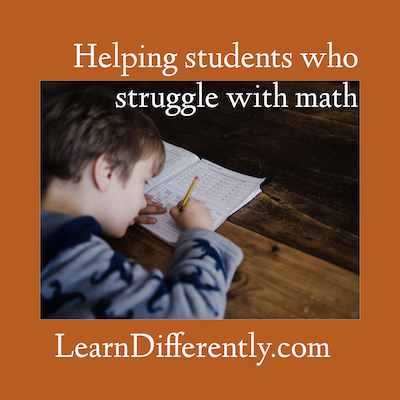Helping students who struggle with math, part 1

By Kathy Kuhl Most adults know how it feels to struggle with math. But some children feel hopelessness about math every single day. They may struggle for many reasons: fine motor difficulty, poor sense of number, language-based learning disabilities, trouble remembering, fear, or discouragement.
But new developments in neuroscience help us understand the difficulties. Math instruction experts such as Christopher Woodin of the Landmark School and Marilyn Zecher of the Atlantic Seaboard Dyslexia Education Center (ASDEC) have applied the Orton-Gillingham principles, which help teach reading to dyslexics, to math instruction. They have transformed how I teach math.
Let’s look at five issues that can cause students to struggle with math, and ways to help. This week I’ll consider two that you might not think of first. But they are vital.
1. Attitude
Some days in high school math, I was drowning. I began telling myself I couldn’t do it. So I couldn’t.
Ever felt that way in any class? Attitudes can block learning, as Carol Dweck’s research on intelligence shows. If you think you’re stupid, you may think every success a fluke, and every failure a proof of your stupidity.
Is your child convinced he or she cannot do math? We can turn that around, but it takes time, encouragement and a fresh approach.
Did you dread math yourself? Our attitudes can infect our children and make them expect failure. If you wanted your child to learn soccer, would your main message be that it is hard? So if you’ve been badmouthing math, please stop.
Does math seem arbitrary and arcane? Often math instructors don’t spend enough time explaining concepts behind procedures. If so, as Tom Clark of VideoText Interactive lamented, students think, “Ours is not to reason why. Just invert and multiply!” No wonder people dislike math.
But math reveals the beauty of patterns. Galileo wrote, “Mathematics is the language in which God has written the universe.” According to mathematician Dr. Lynn Arthur Steen, math is the science of pattern.
Help your children see and enjoy patterns. Denise Gaskins’ books of math games can help build the sense of beauty and play that is at the heart of math. My review of one is here; check the link in my review for more.
2. Handwriting
When I started homeschooling, my son faced many challenges, so I let him write numbers and letters any old way. Now I know that correct numeral and letter formation reduces stress on the hand and arm. This post includes an easy, memorable method to teach how to write numbers correctly.
Other ways to keep handwriting struggles from making math harder:
- Use number stamps and an inkpad instead of writing,
- Turn notebook paper sideways. Use the lines to keep the digits aligned, or
- Large graph paper can help align numbers. (I made our graph paper on my computer with 1/2 squares. You can also buy it in many sizes from my friends at Miller Pads and Paper.)
- Check the accessibility features of your tablet and laptop.
- Software like MathTalk can take math dictation.
- Graphing calculators can help in algebra and beyond. Students see how changing slope and y-intercept changes a line without laboriously plotting each point, for example.
- Learning Wrap-Ups and Learning Palette let students practice math facts without lifting a pencil. (The latter is for students with greater fine motor deficits.)
Look for the beauty of pattern
As we explore math, we see patterns God has built into the universe. Help your kids see that beauty. Numbers can describe the growth rate of cells, the spiral of a chambered nautilus, and the movements of the planets. So look for the patterns: playing with patterns is closely related to math. Play with numbers. Learn about Fibonacci, the Golden Rectangle, the Golden Spiral, Mandelbrot sets. Relax and enjoy mathematics.
This was written for Simply Classical Journal, which printed it in an abridged form here.
Part two of this article is here. Both posts are taken from my workshop, When math doesn’t come easily. The handouts to all my math workshops are the second half of this page.
I could talk for days on how to help students who struggle with math. What would you like me to help you with?

